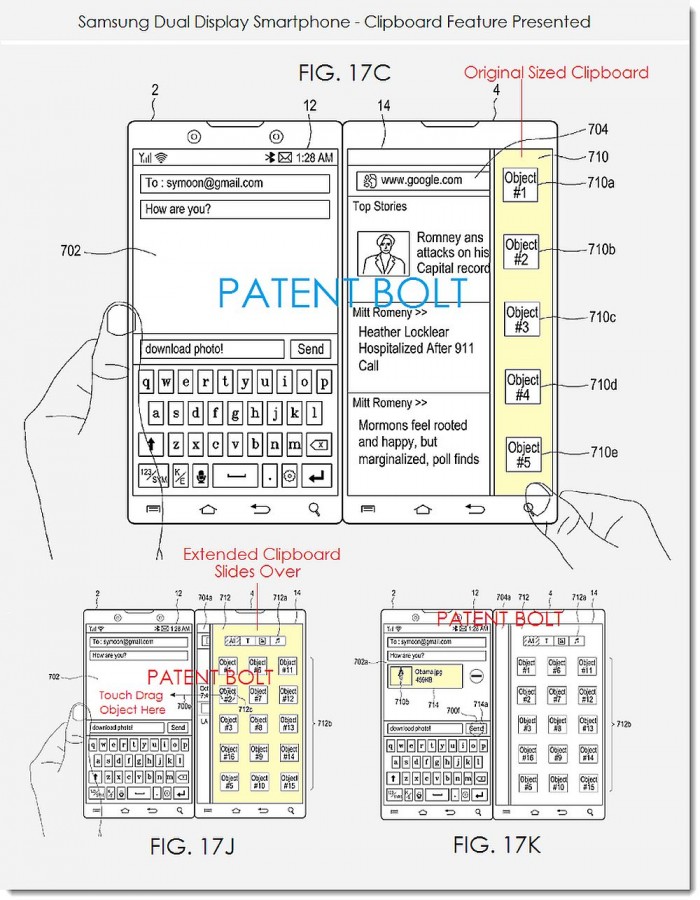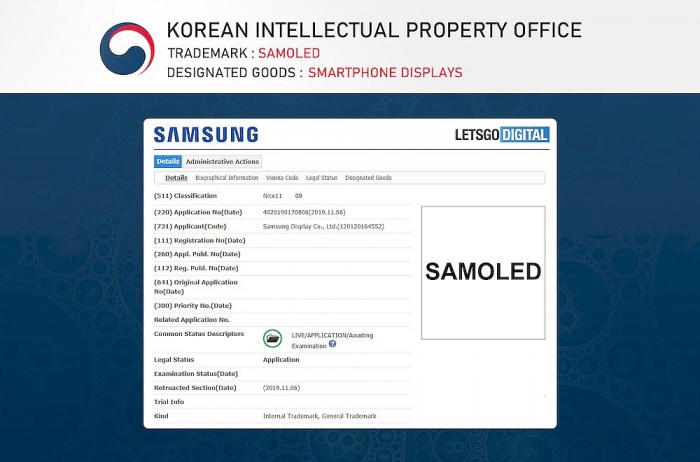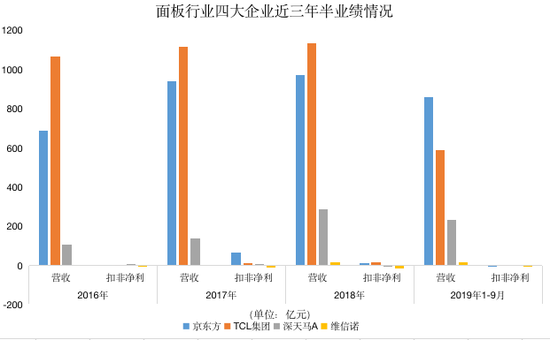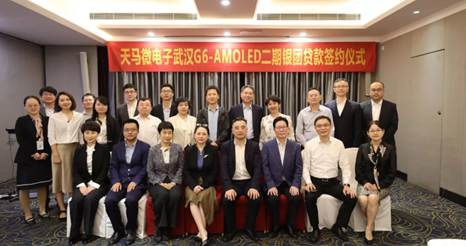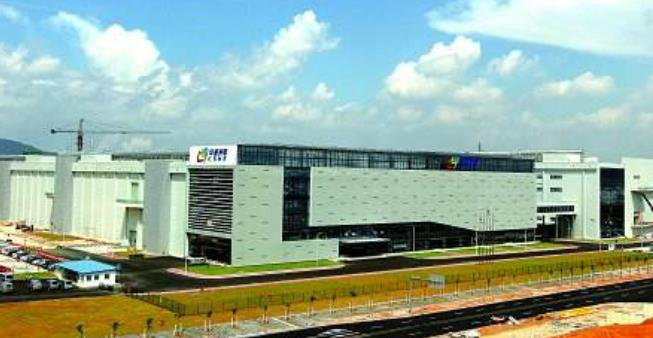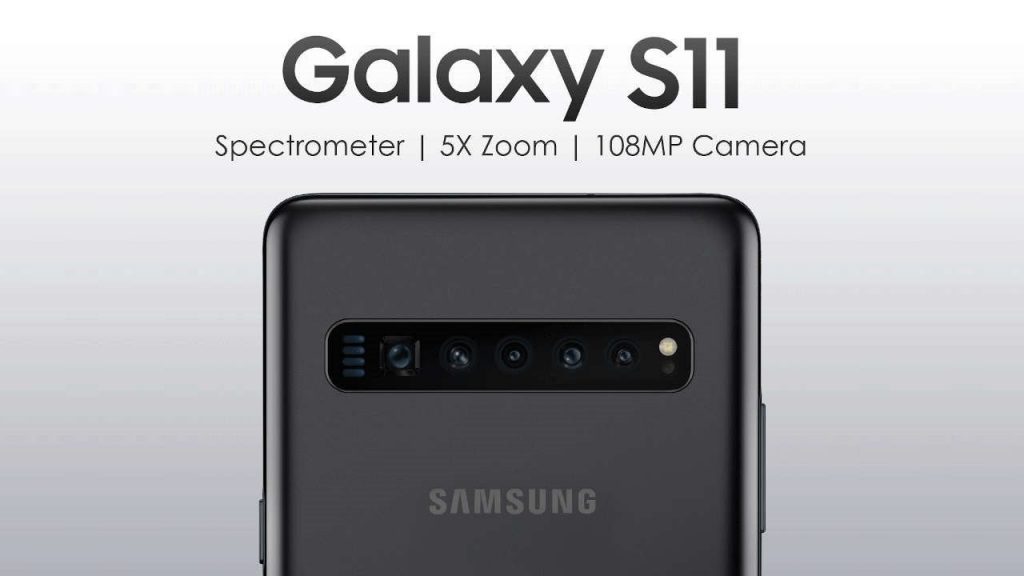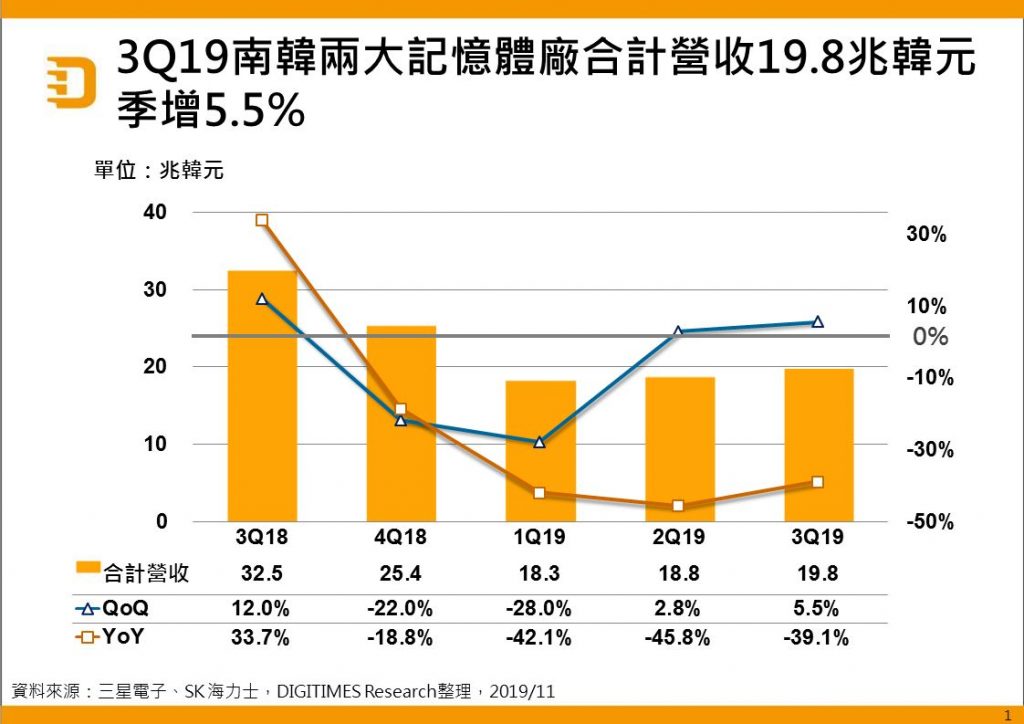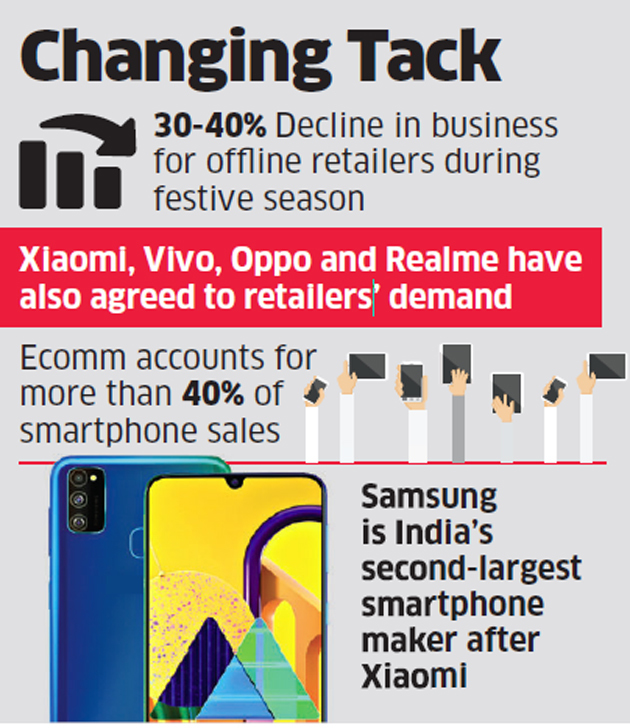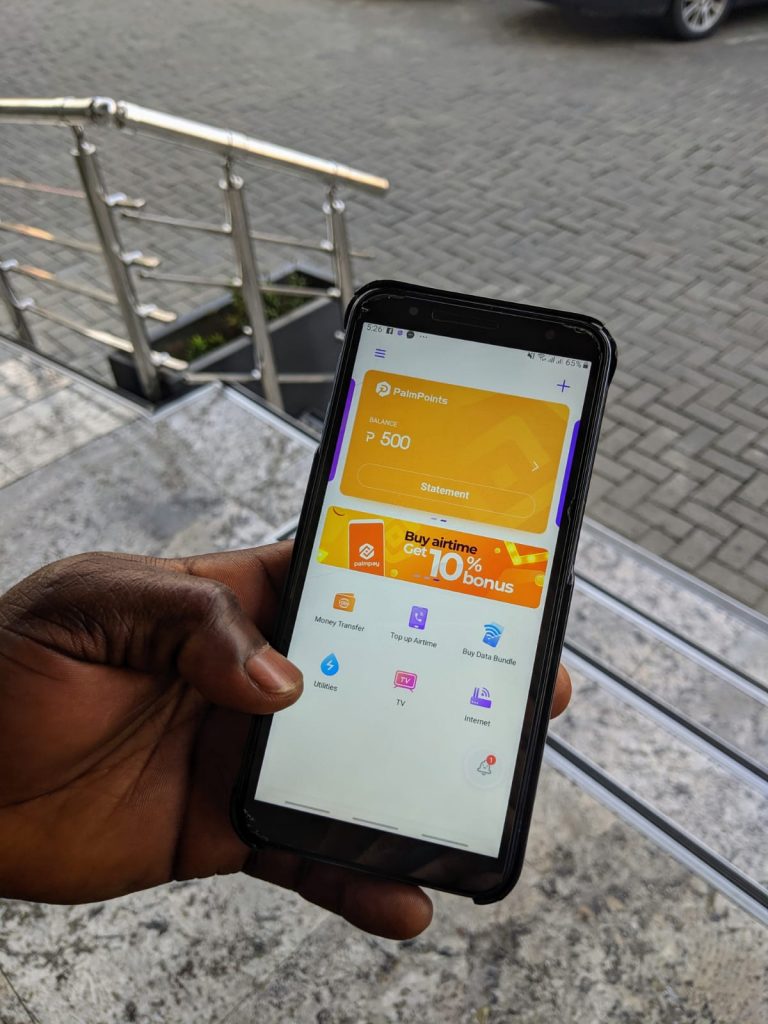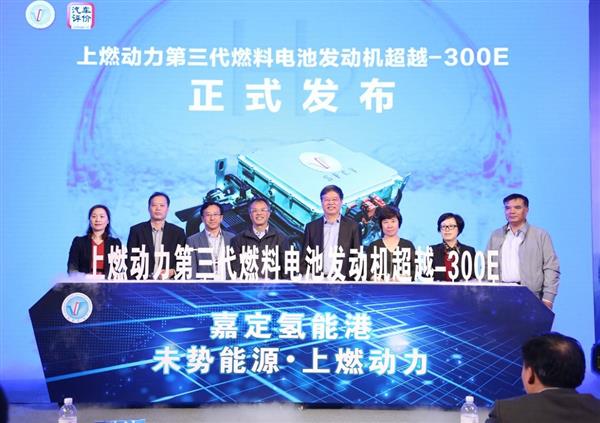
11-13: Samsung Display has reportedly inked an exclusivity deal with Dowoo Insis for Ultra-Thin Glass (UTG); LG Electronics has filed lawsuits against TCL in the German district courts of Mannheim and Düsseldorf; etc.
Chipsets
Qualcomm has indicated that it has been working on 3 generations of 5G chips at the same time. More than 230 5G phones are being designed and developed based on the Qualcomm solution. Qualcomm said that it will showcase 5G commercial smartphones including Lenovo, Nubian, OnePlus, OPPO, vivo, China Mobile and other brands. (Laoyaoba, Sohu, Sina, C114)
Touch Display
Samsung’s patent titled “Samsung Invents Dual Display Smartphones Reflecting New User Interfaces and Modes of Operation” shows a dual-display device just look like Microsoft Surface Duo. (CN Beta, Patently Mobile)
Samsung Display has filed a trademark in Korea with the KIPO (Korean Intellectual Property Office) for the name SAMOLED. The application is categorized as Class 9/11 with the description; “OLED display; smartphone display; monitor; television screen; digital signage; computer screen”. (CN Beta, LetsGoDigital)
Presently, the global panel industry is in a dilemma of weak price growth, and manufacturers are facing shipping pressure. In the first 2 quarters of 2019, BOE and TCL Group’s net profit fell sharply year-on-year. The growth rate of Tianma’s revenue was only single digit, and the net profit of Visionox is not more than CNY500M. (CN Beta, Sina)
According to Digitimes, BOE has started the manufacture of the new display technology panels Micro LED in Kunming, Yunnan Province of China since Oct 2019. Digitimes also believes that the current Micro OLED panel is mainly used in telescopes, but BOE is now using it in AR/VR glasses, first-person view angle (FPV) goggles and projectors for drones. (GizChina, IT Home)
Samsung Display has reportedly inked an exclusivity deal with Dowoo Insis for Ultra-Thin Glass (UTG), which will be used in future foldable phones. It is a mid- to long-term one. And as part of its commitment, Samsung is reported to have funded the display maker with KRW12B investment. This will aid the company jack up its monthly production capacity which currently stands at 500,000 units per month. (GizChina, ET News, Xueqie, Sina, 3DSC)
The second phase of the Gen-6 LTPS AMOLED production line of Tianma Microelectronics Wuhan. The signing ceremony of the CNY6B syndicated loan was held in Shenzhen. At present, the interior decoration of the Gen-6 factory is nearing completion. After the 2nd phase of 2020 is also fully operational, the total production capacity of the Gen-6 plant will reach 37,500 sheets/month of flexible OLED display panels. (Laoyaoba, Sohu, Xueqiu)
Wuhan CSOT has revealed that the output value of t3 project has exceeded CNY10B at the end of Oct 2019, reaching CNY10.9B, becoming the first semiconductor display panel enterprise in Hubei with an output value of over CNY10B. CSOT’s t3 project is the first Gen-6 LTPS display panel production line in China with a total investment of CNY16B. It adopts independent R&D display technology such as Fine Pixel, IEST (Intelligent Power Saving), CPLP (Circular Polarization) and Low Blue Light. (Sohu, Laoyaoba, Sina)
Camera
Samsung is likely to use its second-gen 108MP sensor with QuadBayer 4-in-1 technology in its upcoming Galaxy S11 series. This sensor combines 4 pixels in 1 in order to create a crispy 27MP picture with a lot of details. It can also produce 12MP stills. (GizChina, XDA-Developers, Sohu, CNMO)
Memory
Defects have been found in Samsung Electronics’ foundry products. Earlier 2019, the company had found problems in its first-generation 10nm (1xnm) DRAM products. This time, defects were discovered in its foundry products, undermining the semiconductor giant’s reliability. The defects were caused by the use of contaminated equipment on an 8-inch wafer line located in Samsung Electronics’ Giheung Plant in Korea. (CN Beta, Guru 3D, Techspot, Business Korea)
The production value of South Korea’s memory chip industry increased 5.5% sequentially to KRW19.8T (USD17.06B) in 3Q19, according to Digitimes Research. Samsung saw its memory revenues register a sequential increase for the second consecutive quarter in the third quarter, while SK Hynix’ stopped falling. The pair also had their operating margins fall at a slower pace in the third quarter than previous quarters. (Digitimes, Digitimes, press)
Sensory
Apple is reportedly building a range of virtual reality (VR) and augmented reality (AR) devices around the 3D sensor, the first of which could be a next-generation iPad with advanced AR capabilities. The sensor will be used in part to create “three-dimensional reconstructions of rooms, objects and people”. (Apple Insider, Bloomberg, CN Beta)
Biometrics
Apple’s latest patent indicates that Apple is working on a way to include Touch ID on a future Apple Watch. The patent application, titled “Antenna Assemblies For Watch Bands”, discusses technology that would allow antennas to be embedded inside a watch band. To maintain the comfort of the wearer, the antenna would be able to bend, stretch and flex. (Patently Apple, Phone Arena, Laoyaoba)
Japan Display Inc (JDI) is expected to launch fingerprint sensor production for smartphones in 2019. At the same time, in order to reduce the excessive dependence on the LCD panel of the smartphone, JDI also plans to position the fingerprint sensor and OLED panel as the new business of the company. (Laoyaoba, TechNews, Money DJ, Nikkan)
Battery
Great Wall Motor (GWM) Company subsidy Shanghai Fuel Cell Vehicle Powertrain is launching the third generation “Beyond-300E” 100kW high-power fuel cell engine, the system components are 100% domestically produced, and the related vehicles are officially mass-produced in Nov 2020. (My Drivers, CN Beta, Sohu, Xinhuanet)
Phone
LG Electronics has filed lawsuits against TCL in the German district courts of Mannheim and Düsseldorf, for infringing its LTE technology patents. The lawsuits allege that TCL knowingly implemented technologies in its handsets that infringe three of LG’s standard essential patents that cover key areas of LTE handsets. (CN Beta, Laoyaoba, LG, Korea Herald)
Samsung has launched Galaxy M-series smartphones in India to counter the massive decline in sales volume recorded in the last few financial quarters. The M-series introduced in 2019 is an online exclusive on Amazon, Flipkart, and official Samsung website. The only offline retailers selling the M-series are the Samsung Experience Stores. That could change soon as Samsung is planning to introduce the next Galaxy M device through its third-party offline retail chain in 2020. (Gizmo China, Economic Times, GizChina, 3DSC)
Augmented / Virtual Reality
Apple allegedly plans to release an augmented reality (AR) headset by the year 2022 and a pair of more sophisticated AR glasses in 2023. According to Digitimes, the AR headset is to be assembled by Taiwan’s ODMs Quanta Computer and Pegatron. (CN Beta, Engadget, The Information, Apple Insider, Digitimes)
Automotive
Xpeng Motors, the Chinese electric vehicle startup backed by Alibaba and Foxconn, has raised a fresh injection of USD400M in capital and has taken on Xiaomi as a strategic investor. (TechCrunch, Reuters, Caixin, Xinhuanet, Sina)
Artificial Intelligence
Stradigi AI, a Montréal-based AI solutions provider and research lab founded in 2014, has announced that it has raised CAD53M (USD40.3M) in a series A round led by Canadian institutional funds Investissement Québec and Fonds de solidarité FTQ, with participation from Holdun Family Office, Segovia Capital, Cossette, and company cofounders Basil Bouraropoulos and Curtis Gavura. (VentureBeat)
Payment
Africa focused payment startup PalmPay has launched in Nigeria after raising a USD40M seed-round led by Transsion via its Tecno subsidiary, with participation from China’s NetEase and Mediatek. (TechCrunch, Techpoint)

